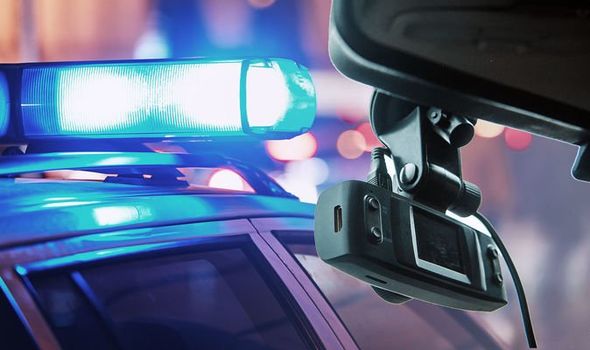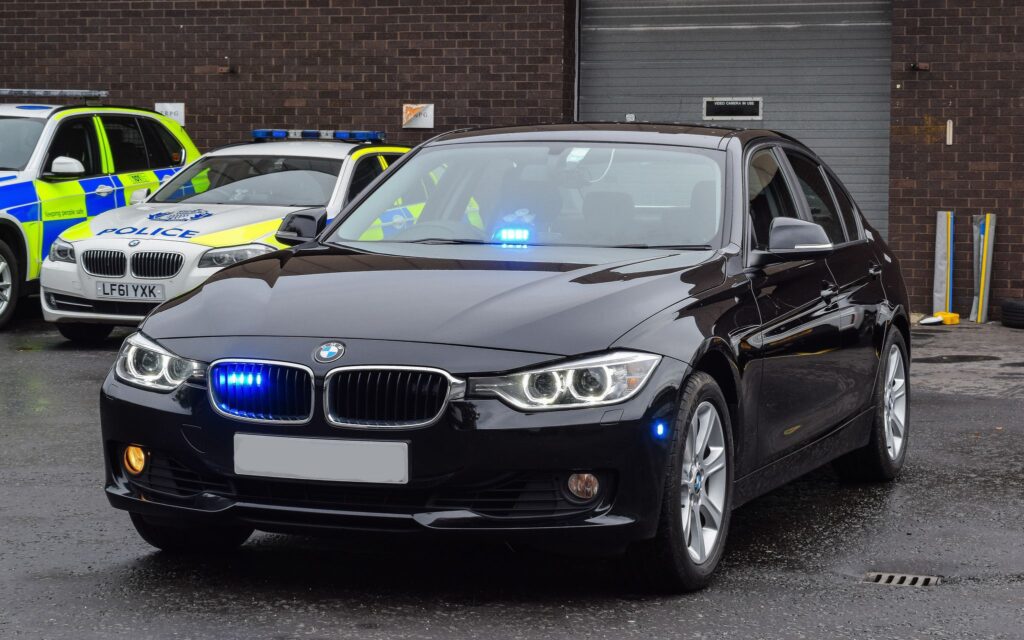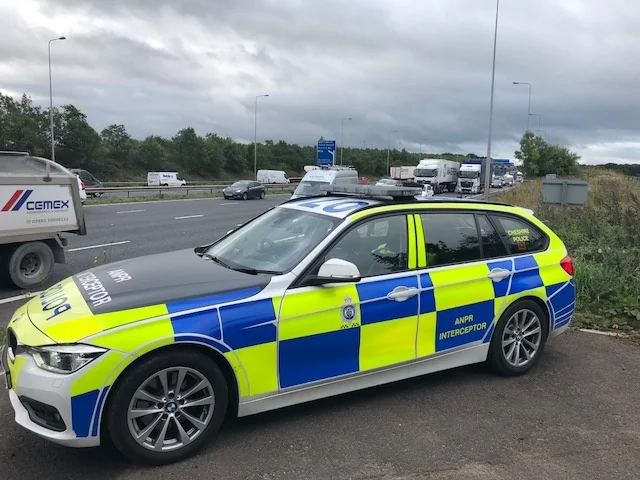Yes, some police cars in the UK do have dash cameras. However, it’s not standard across all forces. Some forces have dash cameras in every marked vehicle, while others do not. The type of dashcam most commonly used by the police is the In-Vehicle Camera System (IVCS).
But there isn’t one specific dashcam used by all police forces in the UK. The use of dash cameras has increased as they help in collecting evidence, ensuring accountability, and training officers. But there are also concerns about privacy and data management.
What Are The Benefits of Dash Cameras in Police Cars?

Evidence Collection
Dash cameras in police cars play a crucial role in evidence collection. The footage captured can provide an unbiased record of events, which can be critical in investigations or legal proceedings.
For instance, in the event of a traffic violation or accident, the dash cam footage can serve as irrefutable evidence. It can also help in identifying and prosecuting offenders in cases of hit-and-run incidents or other crimes.
Accountability and Transparency
Dash cameras promote accountability and transparency in law enforcement. The presence of a recording device can encourage both the police officers and the public to behave appropriately, knowing that their actions are being recorded.
This can lead to a decrease in complaints against police officers and an increase in public trust in law enforcement. The footage can also be used to resolve disputes or complaints against police officers, providing a factual basis for discussions.
Officer Training
Dashcam footage can be an invaluable tool for training new police officers. Real-life footage of various situations can provide practical insights and learning opportunities that can’t be replicated in a training environment.
It allows trainees to review and learn from the actions of experienced officers. It can also be used to review and improve the performance of current officers, by identifying areas of strength and areas that need improvement.
What dashcams are installed in Police vehicles?
The specific type of dashcam technology utilized in police vehicles can differ significantly based on the individual law enforcement agency.
Some departments have made it a standard practice to equip every marked car in their fleet with a dashcam, providing a valuable tool for accountability and evidence collection. However, it’s worth noting that not all agencies follow this practice.
One of the most commonly used types of dashcams by the police is known as the In-Vehicle Camera System (IVCS). This system is designed to capture high-quality video footage of both the road ahead and the interior of the vehicle, providing comprehensive coverage of incidents.
Dashcams can come in various configurations to suit different needs. Front-facing dashcams, for instance, are typically mounted on the windshield of the vehicle.
These cameras have a single lens that records the view of the road ahead, capturing crucial details of incidents that occur within the camera’s field of view.
On the other hand, dual-facing dashcams come equipped with an additional lens. This extra lens is designed to record the interior of the police car, providing an inside view of the vehicle.
This can be particularly useful in situations where there’s a need to review the actions of the police officers inside the car during an incident.
Despite the apparent benefits of dashcams, it’s crucial to note that there isn’t a single, universal dashcam model that is used by all police forces in the UK.
The choice of dashcam can depend on a variety of factors, including the specific needs of the agency, the quality of the footage provided by the camera, and the cost of the equipment.
Can I request dashcam footage from a police car?
Absolutely, in the UK, it is possible to request dash cam footage from a police car, although the process can be quite involved. Under the Data Protection law (DPA 2018), you have the right to access any personal data that pertains to you within the police information.
This is known as a Right to Access Request or a Subject Access Request. However, the police may apply certain exemptions set out in the DPA 2018 to the release of personal data.
If you wish to request digital police information held for someone else, you will need to contact the commander of the borough where the incident occurred.
To secure the footage, you may need to submit a public records request, such as a Freedom of Information Act (FOIA) request, to the appropriate law enforcement agency.
Be ready to provide specific details about the footage and cover any relevant fees. Please be aware, the release of the material is at the discretion of the commander.
Do Unmarked Police Cars in the UK Have Dash Cameras?

Yes, unmarked police cars in the UK are often equipped with dash cameras. While these vehicles may not be easily identifiable as police cars due to their lack of markings, they are still used for law enforcement purposes and thus are equipped with necessary equipment, including dash cameras.
The use of dash cameras in these vehicles can be particularly beneficial for traffic enforcement. The cameras can record instances of traffic violations, providing valuable evidence that can be used in legal proceedings.
This can be especially useful in situations where unmarked police cars are used for covert operations or surveillance.
However, it’s important to note that the use of dash cameras in unmarked police cars can vary greatly depending on the specific police force.
Some forces have made it a standard practice to install dash cameras in every vehicle, marked or unmarked. On the other hand, some forces may choose not to install dash cameras in all their vehicles.
How Long Do Dash Cameras Keep Footage?
The length of time that dash cameras retain footage is contingent on several factors. These include the storage capacity of the device, the resolution of the video, and whether loop recording features are enabled.
Most dash cams come with enough internal memory to store between 12-24 hours of recording time. This means that without any intervention, the device can continuously record for this duration before the storage is full.
However, some models can accommodate up to 32GB or more of storage, which can translate into days or even weeks of footage retention.
In the context of police dash cams, the retention period can vary significantly. In the United States, for example, police departments generally retain dash cam videos for a period ranging from 30 to 180 days.
After this period, the videos are typically destroyed. However, this duration can vary depending on the specific policies of the police department and the nature of the incidents captured in the footage.
For instance, footage involving serious incidents or those that are part of ongoing investigations may be retained for a longer period.
If there’s a need to store dash cam footage for a longer period, one method is to compress the video files.
For example, you could compress every 1920×1080 video on the disk over a week old to 25% size (960×540) and every 960×540 video on the disk over a month old to 25% size (480×270), and so on. This way, you can retain all your videos for a longer period even with limited storage space.
However, it’s important to note that the oldest video becomes highly compressed, which may affect the quality of the footage.
FAQ
Do all UK police cars have speed cameras?
Yes, speed cameras are a common feature in unmarked police vehicles in the United Kingdom. They are used to enforce speed limits and contribute to road safety.
What is the camera on the back of police cars UK?
The camera you see on the back of UK police cars is typically part of an automated license plate reading system. This system captures images of nearby license plates, and a computer inside the car checks the vehicle’s registration.
Is Dashcam mandatory in UK?
While dash cams are legal and can be used without any special permissions on UK roads, they are not a mandatory requirement for drivers.
Are dash cameras always recording?
Yes, dash cams typically record continuously using a feature known as loop recording. However, once the memory card is full, older footage is overwritten unless it has been saved by the user or if the dash cam’s G-sensor has detected a crash.
Do dashcams record if car is off?
Many dash cams have a feature known as parking mode, which allows them to record even when the car is turned off. To use this feature, the dash cam needs to be hardwired to the vehicle or connected to an external dash cam battery.
Do dash cameras record when car is off?
Yes, certain dash cams have the capability to record even when the vehicle is switched off. This feature can be particularly useful in providing evidence in case of incidents like accidents or vandalism that occur when the car is parked.
What are the disadvantages of dash cam?
Some potential downsides of using a dash cam include the possibility of it draining your car battery, the power it consumes, and uncertainty over whether it will record when your car is off. Additionally, if not positioned correctly, they can distract the driver, attract thieves if left in plain sight, and can be expensive depending on the brand and model.
Do Dashcams drain car battery?
A dash cam can potentially drain your car battery by drawing power from it to function. While this isn’t an issue while the car is running and the alternator is charging the battery, if the dash cam is left running while the car is off, it could drain the battery over time.
Do Dashcams record audio?
Yes, most modern dash cams come equipped with a built-in microphone, allowing them to record audio along with video. However, whether or not your dash cam records sound will depend on the specific make and model.
Final words
To sum up, not all UK police cars have dash cameras, but many do. These cameras are used for various purposes like gathering evidence, ensuring accountability, and training officers. However, issues around privacy and data handling exist.
Laws are in place to ensure dash cams don’t obstruct a driver’s view, and you can request footage under certain conditions. As technology advances, we might see more standardization in the use of dash cameras in UK police cars.

